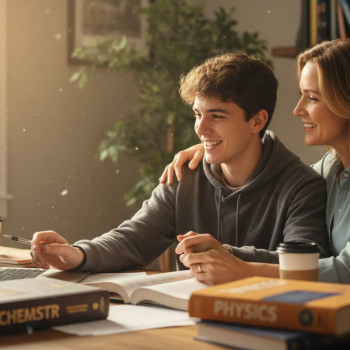Lab Sciences: When Credit Doesn’t Equal Lab Exemption
It’s a crisp spring evening and you’re scrolling through your inbox, juggling permission slips, soccer schedules, and — again — the question of whether your child’s AP score will get them out of that last high school science lab. If that sounds familiar, you’re not alone. Plenty of families discover, often late in the game, that the path from AP success to school schedule freedom isn’t always straightforward.
Why this matters (beyond checking a box)
Lab courses aren’t just a graduation requirement in many districts; they’re a learning experience with hands-on skills, safety protocols, collaboration, and an opportunity to apply scientific thinking in a real way. For students headed to STEM majors, doing a high school lab can be an advantage. For others, being freed from a lab requirement could open space for an internship, dual enrollment, an arts elective, or simply a reduced course load during a stressful senior year.

AP Scores, College Credit, and High School Policies — They’re Separate
First: take a breath. AP exams and AP scores are administered by the College Board. Colleges use AP scores to decide whether to grant college credit or advanced placement. High schools decide whether an AP course or an AP exam score satisfies their internal graduation or course-sequencing requirements, including lab exemptions. The result: a student can earn college credit for an AP Biology exam but still be required by their high school to take a hands-on laboratory course to meet a local graduation or district science requirement.
This separation is the root of many parental frustrations. Policies vary widely — sometimes between neighboring schools in the same district — because local school boards, counselors, and curriculum offices determine what counts as meeting a lab competency.
Common scenarios parents see
- Student scores a 4 on AP Chemistry. The college they plan to attend accepts it for credit, but the student’s high school still requires a daytime lab course for state graduation.
- AP Physics lab component doesn’t align with a district’s specific lab competency checklist, so the student must still complete certain in-person lab hours.
- A student takes AP Environmental Science online, earns college credit later, but the local school district only honors in-person lab work toward their science sequence.
How to find out what your school requires
Don’t rely on a single hallway rumor. Use a short, targeted checklist to make sure you know exactly where your student stands:
- Ask the school counselor for the district’s official policy on AP scores and lab exemptions — request it in writing (email is fine).
- Contact the curriculum director or science department chair if the counselor can’t provide specifics; they usually know whether AP exams satisfy lab competency requirements.
- Check your state’s high school graduation requirements: some states require a certain number of laboratory science credits that can only be earned through in-person coursework.
- Ask colleges your child is considering whether they grant credit/placement for AP scores — but remember: college credit doesn’t automatically erase high school lab needs.
Key questions to ask your school
- Does an AP exam score satisfy the high school lab science requirement or only a science content requirement?
- If an AP score is accepted, what minimum score is required for exemption?
- Are there documentation or demonstration-of-competency steps (lab portfolio, teacher verification, or practicum) required to validate the exemption?
- Does the district accept dual-enrollment lab courses in place of AP lab requirements?
- If my student plans to graduate early, how will AP credit be treated toward those lab requirements?
Illustrative table: Typical outcomes you might encounter
| Situation | Possible School Response | What You Should Do |
|---|---|---|
| AP Biology score 4 or 5 | College grants credit; high school accepts it as a science credit but still requires an in-person lab for graduation. | Request written policy from counselor; ask about options to demonstrate lab competency (portfolio or summer lab program). |
| AP Chemistry score 3 | Some colleges may give elective credit; high school may not accept it for lab exemption. | Confirm minimum score needed for exemption; if denied, plan to take the high school lab or explore summer dual enrollment. |
| AP Environmental Science, online course | College accepts for credit; district requires physical lab hours, so no exemption. | Ask about alternative lab experiences (community college labs, verified fieldwork). |
When a school asks for ‘lab competency’ — what that might mean
Some districts don’t simply accept an AP exam score; they require proof that students have completed certain hands-on skills: accurate measurement, following procedures, proper use of equipment, data analysis, and safety. That’s because labs teach process and habits you can’t easily demonstrate with a multiple-choice exam.
Procedurally, this may take the form of:
- A lab portfolio showcasing experiments, raw data, and reflective analysis.
- A supervised practical exam administered by the science department.
- Teacher verification from an AP instructor stating the student completed required lab hours and competencies.
How to build a convincing lab portfolio
If your school requests documentation, help your student create a neat, well-organized lab portfolio that includes:
- Clear lab titles, dates, and objectives.
- Photographs or scans of lab work (setup, data tables, graphs) where permitted.
- Raw data and a short reflection explaining the procedure, results, and lessons learned.
- Teacher comments or signatures when possible.
A thoughtful portfolio demonstrates not just that your child knows scientific facts, but that they can act like a scientist — and that carries weight when schools evaluate exemptions.
Real-world example: How families navigated mixed messages
One family I know planned to use a strong AP Chemistry score to avoid a senior-year lab. The counselor verbally said it would be fine, but when schedules were finalized, the registrar flagged the missing lab requirement. The family pushed for clarity and eventually produced a teacher-signed lab log plus a brief practical exam run by the science chair. The student avoided repeating a full semester course — but only because the family documented everything and stayed persistent.
The lesson is simple: get confirmation in writing early and be ready to provide proof of competency.
When keeping the lab is actually better
Before you celebrate an exemption, consider whether keeping the lab could be better for your child. If your student:
- is still exploring potential STEM majors, a high school lab can strengthen applications and skillsets.
- benefits from in-person mentorship or collaborative learning, the lab may provide formative support.
- needs to improve lab techniques or gain deeper conceptual understanding, a supervised lab is valuable.
Also, some colleges value seeing a progression of coursework — that the student didn’t skip essential in-person learning, even if they already have AP credit.
Practical timeline and action plan for parents
Here’s a practical timeline you can use starting in sophomore year and continuing through graduation planning.
- Sophomore year — Start conversations with your student’s counselor about graduation requirements and opportunities to take AP lab sciences later.
- Junior year — If your student plans to take an AP lab science, review the district’s lab competency policy. Encourage careful lab notebooks and signed verification from AP instructors.
- Before senior scheduling — Request written confirmation of whether an AP score will fulfill lab requirements. If the answer is unclear, ask what documentation the school will accept.
- After AP scores — Immediately share score reports and any portfolio documentation with your counselor and science chair. If needed, arrange a practical assessment or provide teacher verification.
Sample email template to request written policy
Below is a simple structure you can adapt when emailing your counselor or science coordinator. Polite, clear, and specific is most effective:
“Hello [Counselor Name],
My child, [Student Name], is planning their senior schedule and we want to confirm the district policy regarding AP exam scores and lab science exemptions. Could you please provide the official policy or direct me to where it’s documented? Specifically, does an AP laboratory-science exam score (for example, AP Biology or AP Chemistry) satisfy the high school lab science graduation requirement, and if so, what minimum score and documentation are required? Thank you for your help. — [Your Name]”
What if the school says ‘No’ — alternatives and workarounds
If your district won’t accept AP exam scores for lab exemptions, here are reasonable alternatives to consider:
- Dual enrollment at a nearby community college for a lab course that meets district standards.
- Summer lab programs or verified fieldwork that the district recognizes.
- Requesting a supervised competency exam or creating a portfolio with AP teacher verification.
- Working with your counselor to add the lab during a less critical semester to avoid overloading your student.
How targeted tutoring can make the difference
Preparing for AP lab sciences is not just about memorizing facts — it’s about developing experimental intuition, lab skills, and confidence. That’s where smart tutoring fits in. Personalized tutoring, like Sparkl’s 1-on-1 guidance, can help your student build the lab competencies schools value: interpreting data, designing experiments, and practicing safety and technique. Tutors can help document lab work efficiently for a portfolio and prepare students to take any practical competency tests the school might require.
When tutoring is tailored — with a study plan focused on hands-on skills and reflective lab writing — it becomes easier to demonstrate competency beyond a multiple-choice score. If your child is aiming for a lab exemption, this focused preparation often pays off in time saved and stress avoided.
What to look for in a tutor for lab science
- Experience with AP lab curricula and an understanding of local school expectations.
- Ability to coach students in building a lab portfolio and in practical techniques.
- Flexible scheduling for supervised sessions aligning with school deadlines.
- Use of tools and feedback loops (e.g., session notes, progress tracking, and AI-driven insights) to document improvement.
Balancing college credit and meaningful learning
It’s tempting to treat AP scores purely as currency for college credit. But when it comes to lab sciences, consider two goals in parallel: earning college credit and gaining authentic lab experience. If an AP score saves tuition dollars but bypasses essential hands-on training, students may start college underprepared for lab-based courses.
Weigh short-term convenience against long-term preparedness. For some students, keeping the lab is a wise investment in their scientific maturity. For others, particularly those certain of non-lab-focused majors or with strong alternative lab experience, exemption makes sense.
Final checklist for parents
- Get the district policy on AP exam lab exemptions in writing by the start of senior scheduling.
- Document lab competency with a portfolio, teacher signatures, or a practical test if required.
- Consider whether the lab offers value beyond a graduation checkbox — in learning and college readiness.
- If your child needs help preparing for competency demonstrations, explore targeted 1-on-1 tutoring and study plans to fill specific skill gaps.
- Stay flexible: have a backup plan for schedule adjustments if the exemption doesn’t go through.

Parting thought
When AP credit and high school lab requirements don’t line up, it’s easy for families to feel blindsided. But most situations are solvable with clear communication, a little documentation, and targeted preparation. Whether your student keeps the lab or earns an exemption, the goal is the same: authentic learning and a pathway that supports future success.
Keeping a dialogue open with counselors, building a strong lab portfolio when needed, and using focused support — including personalized tutoring when it fits — will help your family navigate the system with confidence. At the end of the day, the best outcome is not simply a freed schedule, but a student who truly understands the science behind the score.
Need help turning lab experience into documented evidence or prepping for a competency check? A smart, personalized approach — with an expert tutor who knows AP labs and school expectations — can make the difference between a stressful scramble and a smooth path to graduation.


















No Comments
Leave a comment Cancel